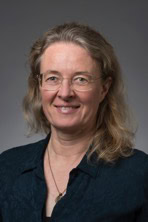Annette Skovsted Hansen is associate professor at Aarhus University, Denmark. She lives in Bjødstrup, Denmark, and has been a member since 2000.

Annette Skovsted Hansen
Website: https://pure.au.dk/portal/da/ostash@hum.au.dk
Alma maters: BA (Japan studies), Copenhagen University, 1989; MA (history), Columbia University, 1992; ABD for MA (international education development), Teachers College, Columbia University, 1998; PhD (history), Copenhagen University, 2001
Fields of interest: Japan, global, world, maritime, network theory
Describe your career path. What led you to where you are today? First of all, my degrees and all my professors and fellow students from Columbia and Copenhagen universities. Second, a year at the Inter-University Center in Yokohama, 1993–94; eight years in the Department of Information at United Nations Headquarters, 1991–98; and a year at Frederick Douglass Academy in Harlem, New York, led to a tenure-track position in the history and the Japan studies departments at Aarhus University in 2001.
What do you like the most about where you live and work? My home in Bjødstrup in the Danish countryside offers lots of fields, woods, a local community, and fresh air for my husband, my two daughters, our dog, cat, and myself. With a daily commute of 45 minutes to my office where there are historians of many other regions of the world, I enjoy open office doors, a stimulating research environment that engenders various mutual projects, and many inquisitive and inspiring students.
Conversations with students and colleagues have most recently resulted in a new MA program in language-based area studies (GLAS). GLAS engages the students and professors who team teach most of the courses in exploring how language gives access to knowledge and understanding that is useful for others. Already during the courses, professors of Brazil, China, India, Japan, and Russia are sharing their area specific knowledge in a common exploration with students of topics such as migration, the Wilsonian moment, the nonaligned movement during the Cold War, and waste management.
What projects are you currently working on? First, a project on enslaved people, fish, and oil in Japanese and Danish involvement in two ports in Ghana. This project involves researchers at Aarhus University, Japan, and Ghana. The second is an alumni network linking individuals from four continents to each other and to Japanese hosts of various human resource development courses offered since 1959 and financed by foreign aid through Japan’s Ministry of Economy, Trade and Industry and Japanese companies. Both projects reflect my ambition of finding ways to write global history.
Have your interests evolved since graduation? If so, how? My PhD was on the institutionalization of language through ideology, education, and lexicography in 19th-century Japan, so yes, my interests have evolved. However, not least inspired by my work at the United Nations before graduation. Working at the United Nations alerted me to the 70-year history of competition for goodwill, trade contracts, and votes between donors of foreign aid. Later the evolvement of global history, entangled histories, and seascapes as research fields have greatly influenced my own thinking and writing.
What’s the most fascinating thing you’ve ever found at the archives or while doing research? In 2002, I was at the national archive in Paris searching for material related to the negotiations of what to include in the dictionaries published by the French Academy since the 1600s. I found a lead to the discovery of a court case between the French Academy and another publisher of an official French dictionary, which very clearly showed the financial interests in national language dictionaries.
What do you value most about the history discipline? The attention to time and sources and the stories they tell. How time alone or in combination with geographic space allows for differing perspectives, which together with oral histories from individuals, nuances our approach to understanding our pasts.
Why is membership in the AHA important to you? The community of historians that AHA represents enriches my work even from afar.
AHA members are involved in all fields of history, with wide-ranging specializations, interests, and areas of employment. To recognize our talented and eclectic membership, Perspectives Dailyfeatures a regular AHA Member Spotlight series.
This work is licensed under a Creative Commons Attribution-NonCommercial-NoDerivatives 4.0 International License. Attribution must provide author name, article title, Perspectives on History, date of publication, and a link to this page. This license applies only to the article, not to text or images used here by permission.



